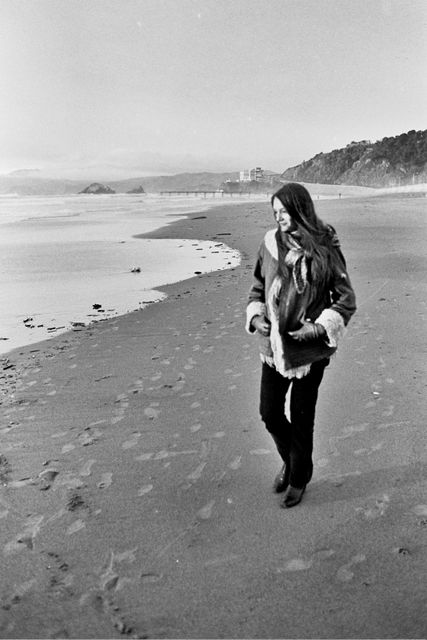
Siena Carlton-Firestone arrived in San Francisco in 1966, a 19-year-old working class Grand Rapids, Michigan native taking a break from attending university at Antioch in the midst of some personal turmoil. Before long Siena fell in with a group of fellow Antioch students living in the Haight-Ashbury who were involved in the San Francisco Diggers. The Diggers were a group of anonymous acid-fueled street anarchists — dancers, poet-playwrights, actors, mechanics, longshoremen, artists, runaways, bikers, etc. — who were building a communal urban community that avoided the use of money, one “free” public project at a time. Diggers provided free food; they ran a free store; they put on free public events; facilitated free housing and free LSD; and so on.
Siena took part in it all — this whirlwind of activity from Fall 1966 through 1967 and beyond, that helped midwife the ’60s counterculture — becoming “Natural Suzanne,” a nickname whose derivation is revealed below. Her boyfriend for much of this period was Emmett Grogan, the Diggers’ most notorious member, and the one most heavily mythologized, both at the time in the underground and mainstream press, and later, in his 1972 fictional autobiography Ringolevio.
I interviewed Siena one evening in August, 2010 at her Sacramento, California home. She’s had quite a life — at the time that I interviewed her, she was working as an attorney in the Sacramento County Public Defender’s Office (she has since retired) — and the Diggers period was only a short, small part of it. Nonetheless, her time in the Diggers was formative and pivotal, and more than 40 years after the fact, Siena’s memories were sharp and often affectionate, her insights by turns loving, forgiving and — necessarily, given the subject matter — devastating. We talked for over two hours and it was clear to me that we were only scratching the surface of an extraordinary period in an extraordinary life.
The following text is a transcript of that 2010 conversation, which has been expanded on via email conversation in the last year. It has not been edited down for a general audience, and many incidents and personages are spoken of without context, or only in passing. There are, inevitably, a few digressions. My advice to the casual-but-curious reader is to simply let these unfamiliar/unexplained bits pass. Keep reading, there’s a good chance you’ll like the next part. (For more about the Diggers, consult the vast archive that has been maintained for decades by historian Eric Noble at diggers.org)
This presentation has been prepared in extensive consultation with Siena. Any errors of transcript are mine, and notice of any corrections of fact would be greatly appreciated.
This is the fourth in a series of interviews with original San Francisco Diggers that I am presenting online for the first time, constituting a kind of collective oral history. Each interview is accessible here. More to come.
Please note: I have incurred not insignificant expenses in my Diggers research through the years. If you would like to support my work, please donate via PayPal. All donations, regardless of size, are greatly appreciated. Thank you!
Read more: FAST LEARNER: Siena Carlton-Firestone (aka Natural Suzanne) testifies on her San Francisco Diggers days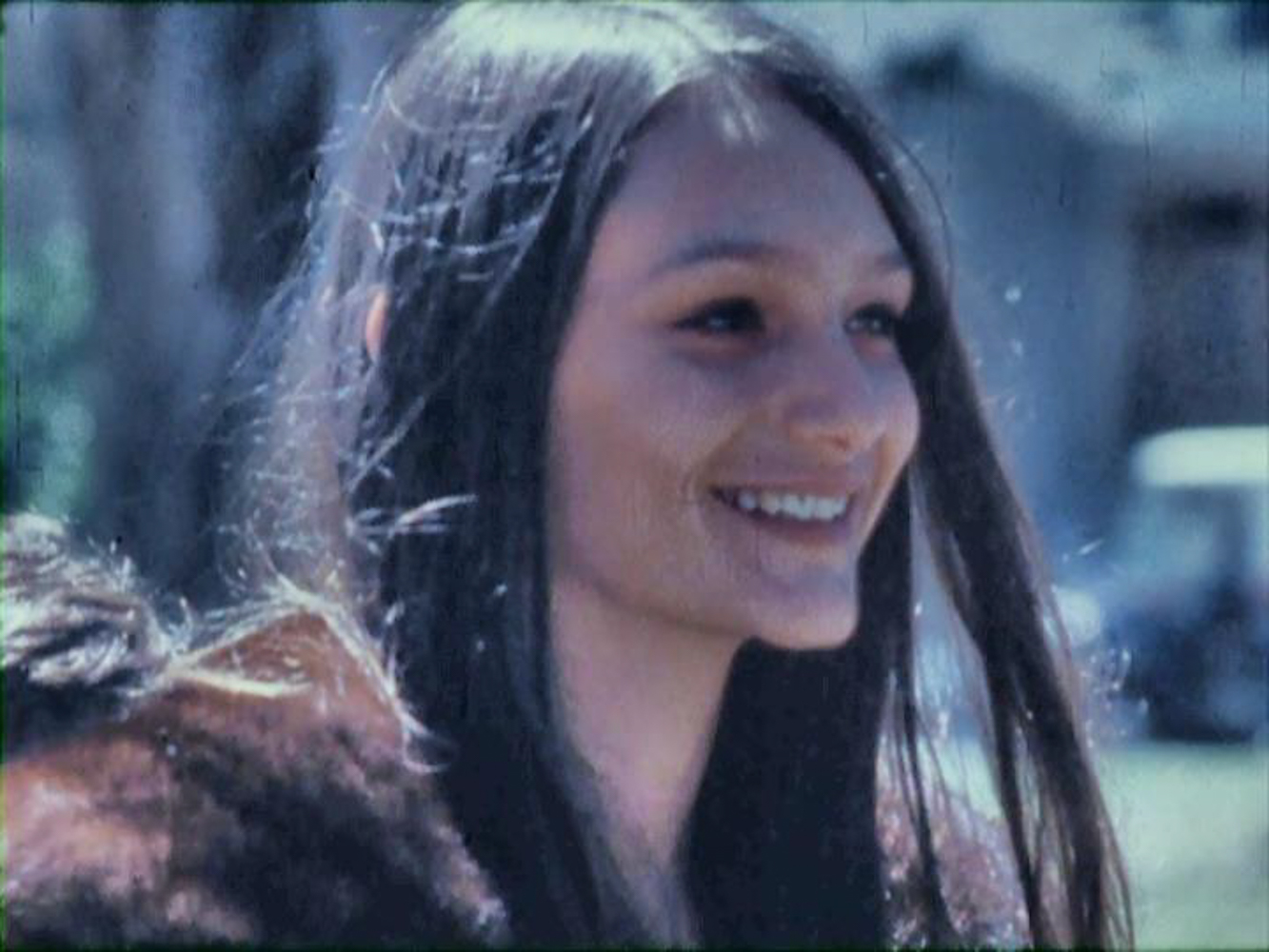
Siena Carlton-Firestone: I was born in Grand Rapids, Michigan in 1947. I grew up in a very blue-collar, middle class family . My mom was a stay-at-home mother with seven children, and I was the oldest. My dad worked very hard to support our family. He and his mother owned and ran Carlton Catering Company. Their main customer was Capital Airlines which flew back and forth from Grand Rapids to Chicago. They created the cutest little petite-point sandwiches along with darling little cakes covered with pastel frosting and a frosting rose in a glassine box tied with a ribbon. Passengers loved them. Capital was bought out by United Airlines and Carlton Catering was over and done. After that my Dad worked in small local factories.
My dad was the greatest. He spent his childhood in foster homes even though his mother was alive and well. I don’t think he had the opportunity to graduate from high school but he had a mind as bright as anyone I knew. My mother and her sister and brother suffered a great deal during the Depression. My great-grandmother would take them to churches where they could eat if they professed to the church ministries.
I learned at age 17 that my dad was not my birth father. My dad had always included me in the loop with his children, my brother and five sisters, he’d never made me feel like an outsider. But I was shocked. The knowledge that I had been deceived by both my mother and my dad set me on a path that I might not have otherwise followed. [See Endnote 1 for more on Siena’s birth father.]
Jay Babcock: How did you get from Grand Rapids to San Francisco?
I left Grand Rapids in 1965, for Yellow Springs, Ohio to attend Antioch College. Rod Serling, the creator of The Twilight Zone, had been a visiting professor at Antioch. My aunt had attended an outdoor summer theater production and fell in love with the campus. Antioch was the only college I applied to; it was as far from home as I could get.
My teenage life was very protected. I wasn’t allowed to date and I was limited to outings with the small group of girls who I called my friends. Life changed suddenly at Antioch: anti-war sentiments, poetry, literature from unfamiliar sources, walking through beautiful Glen Helen, meeting people, having my first boyfriend.
The Antioch experience had two basic twists on conventional colleges. First, the program was set up on pass/fail basis. That left me with time to attend foreign movies, to go to any seminar or presentation that seemed interesting, to spend hours playing bridge. For the first time, “school” wasn’t important to me.
Second twist was the work/study program. Time on campus was rotated with work at a job off-campus. I first spent time off-campus living in a Kentucky mining town. It was depressing. My favorite job was teaching at a winter school camp for sixth-graders in the woods on a small lake in New Hampshire, marching them onto the deeply frozen lake during the new moon. The sky was black and deep. The stars and planets were frozen in place. My job, using a flashlight as a pointing device, was to show them the constellations and the Planets along with the Greek Myths associated with them.
After that winter’s experience, back at Antioch, I met a young man. Together we hitchhiked together from state to state. But young love can rapidly fade, and one afternoon, looking out my dorm window, I saw him with his arm around the proverbial red-headed girl. Heartbroken, I switched from study to work session. I got a job in Chicago and lived in an apartment on the South Side with other Antioch students who were on work session. I did not like Chicago. Children threw bricks at me on my way to the El and one time I was held up at gunpoint on my way home from the East Dorchester stop.
At my parents’ suggestion, I flew to San Francisco to stay with my uncle, who lived in the Marina district. He was a commercial fisherman with his own boat who line-caught salmon. He became my surrogate father, since I was still angry and confused about the hidden father issue. He gave me his studio apartment on Jefferson Street and took up living on his boat. What a great guy. I miss him a lot.
So you were in San Francisco in 1966….
I hadn’t been in college that long. Time-wise, I would have been a sophomore but credit-wise, more like a freshman.
How did you come in contact with the Diggers?
One day I was walking along the sea wall at the Marina and I ran into someone from Antioch. He said, Oh you should come down to the Haight-Ashbury. There’s some people there from Antioch. Those people were Nina Blasenheim, Bobbi Swofford, and a man named John, whose last name I forget. They lived in a house on Ashbury Street — this is the house that was being used to cook the “Digger Stew,” which was the early mainstay of Free Food. On the night I visited, I met Emmett Grogan. He asked me to go with him for a walk in Buena Vista Park and from then on we were together until we were no longer together. (A sidenote: Emmett claimed that a poem written by Richard Brautigan, “Nothing Ever Happens in Buena Vista Park,” was written for us after Emmett told Richard that that was where we met.) [See Endnote 2.]
But I’d had another “first” introduction to the Diggers. One day in October 1966 I was on a bus coming home from my job downtown. Traffic was totally stopped, way down by Fillmore Street. I’m sure you’ve seen that picture of Emmett, Peter Berg, Brooks Bucher, Robert LaMorticella and Kent Minault on the courthouse steps. They were celebrating beating the charges that came from when they’d been arrested that day in the process of doing a bit of street theater, which was what had caused the traffic I’d experienced. They had handed flyers to the people on the corner of Haight and a cross street to play “The Intersection Game.” What the participants didn’t know was that there were several versions of the game resulting in complete chaos holding up traffic for miles. In addition, these crazy Mime Troupe actors were wearing gigantic three-dimensional masks on their shoulders confusing things even further. The actors were arrested, and the masks were taken into custody. The traffic slowly unraveled, and I made it home.
There was a third “first” introduction. I was just walking down Haight Street and somebody handed me a piece of paper that was all cut in curlicues — somebody had really taken the time to cut this elaborate design out of a piece of paper — and it said, Bring your bowl to the Panhandle for free soup. So I went to check it out: I didn’t have a bowl, I wasn’t hungry. And then I saw Nina there, with Bobbi Swofford and Cindi. And Emmett.
I started to go to all of the Digger functions and all the Mime Troupe functions with Emmett. There was the responsibility of Free Food, and we had a Free Store. Whatever needed doing, I did that.
Emmett was a very social person. Wherever he went, people loved to listen to him talk. He had a magnetism that was amazing. And so I just kind of went with him wherever he went — it could be anywhere, from one extreme of society to another. Which is how I met Richard Brautigan, and all the Beat poets: Lew Welch, Allen Ginsberg, Michael McClure, Gregory Corso. Michael McClure and Emmett were really good friends so I got to know him pretty well.

Where was Emmett living?
When I first met him he was living in a studio apartment on Fillmore Street. Another person from the Mime Troupe was also living there: John Robb. But John never really got into the whole Digger thing, he was a purist in terms of his acting and street theater. He would tear his Pall Mall cigarettes in half and save one half in his shirt pocket. Emmett had this little place in an incredible San Francisco building. I stayed with him there.
Before I met them, Peter Cohon aka Peter Coyote, lived across the street. Peter once told me how he met Emmett. He was having coffee at his breakfast table, watching a man on the roof across the street acting out some bizarre story alone and by himself. When Peter went into the Mime Troupe that afternoon, there was the same guy trying out for a job as an actor. Of course that was Emmett, and they were friends from then through forever more.
From there we moved to the Castro area, into something like a storefront with a kitchen and a bathroom in the hall. We paid $80 a month. It had no glamour or panache but at lest we were together. It was during that time Emmett introduced me to Billy Batman [Jahrmarkt] and his wonderful wife Joan. [See Endnote 3.]
What were your first impressions of Emmett?
I had never met anyone like him. He was from Brooklyn. He was a very unusual person. When I met him, he’d just gotten out of the Army. When he started in the Mime Troupe, he’d just gotten out of the army psych ward. He’d been stationed at whatever the Army base is that’s in San Francisco, but he didn’t like being there. So here’s how he was: the first thing he did to try to get out was during bazooka training, they’re all out on a field, and he just pointed the bazooka up in the sky and shot it. Everybody was running around trying to find shelter, and Emmett just stood there. After that they put him into the mental ward. First thing he did there was take all of the beds in the ward and tie them together in the middle of the room. So, that kind of added toward his reputation for lunacy. Then they had him doing some job xeroxing stuff and and he made like 1,000 xeroxes of himself. So they let him go. They said, We don’t want you. But it’s like, okay…what kind of a character puts himself in the range of bazooka fire?
The first time I stayed with Emmett he pulled a gym bag out of his closet and showed me hundreds of pills inside the bag. He told me they were the psychotropic medications that the army had given him while he was locked up in the psych ward. He didn’t take any of them. He saved them and took them with him when he was finally released.
The few years I spent with Emmett changed my life. Wherever we went, I was being exposed to something that I would never have been exposed to in my little other life that I came from, being wrapped in a cocoon. My life became an adventure. I read and I thought in new and exciting ways. I met poets and artists, geniuses and all manner of talented human beings.
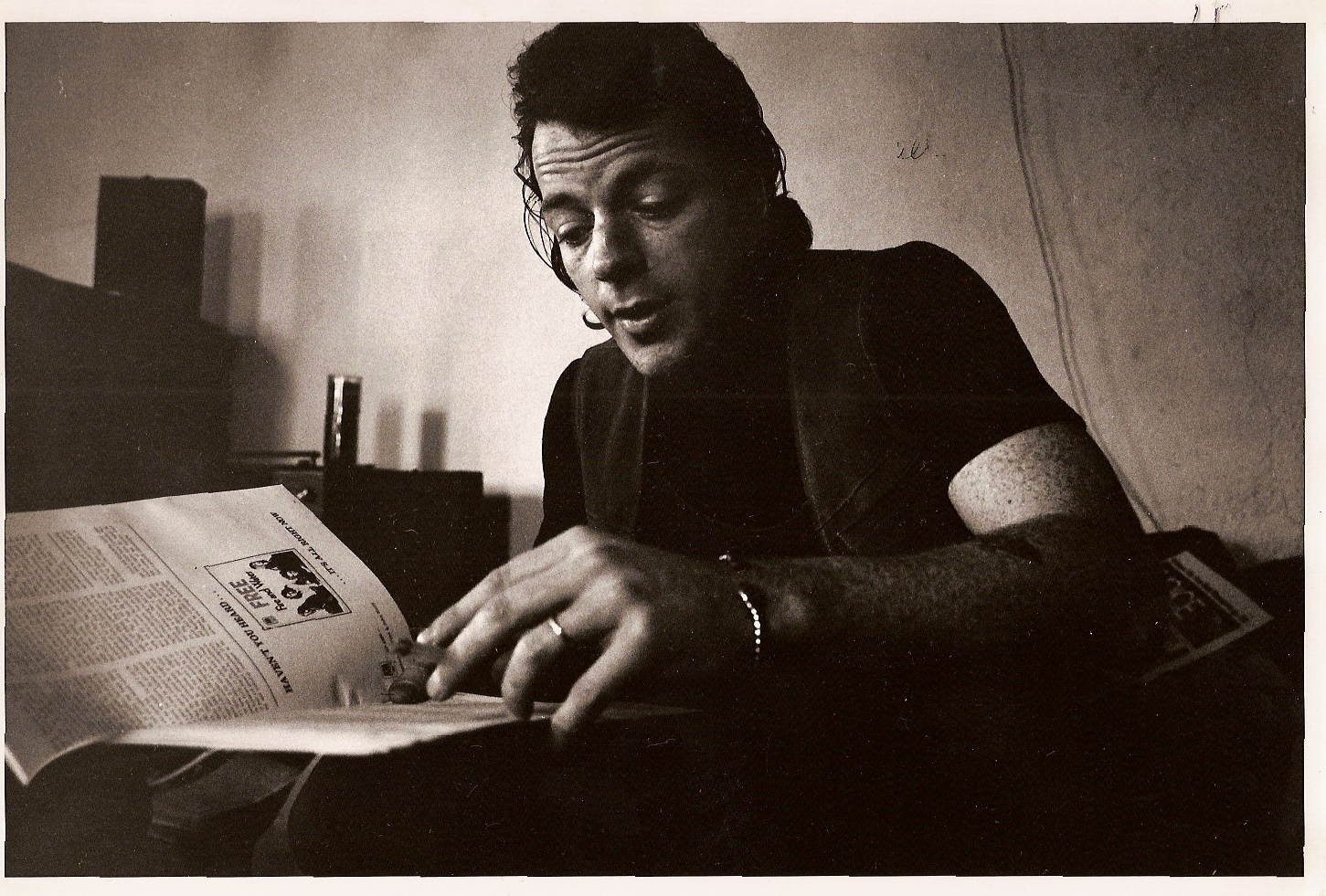
It’s a pretty amazing circle.
Peter Berg, to me, was a certifiable genius. He was one of the directors at the Mime Troupe. When I first met him, he and Judy [Goldhaft] weren’t together yet. She was actually married to the father of her first child, Aaron, but they were breaking up. And, her husband was a really incredible artist, very experimental. When I was doing the Mime Troupe thing, I’d go to classes, just have fun. I always remember when she and Peter started going together, we were in a class and he came in and grabbed her around the waist and kissed her between the legs. Which, you know, was like, Whoa! It was sweet and all. Very sweet. Then after that, they were a couple, going together.
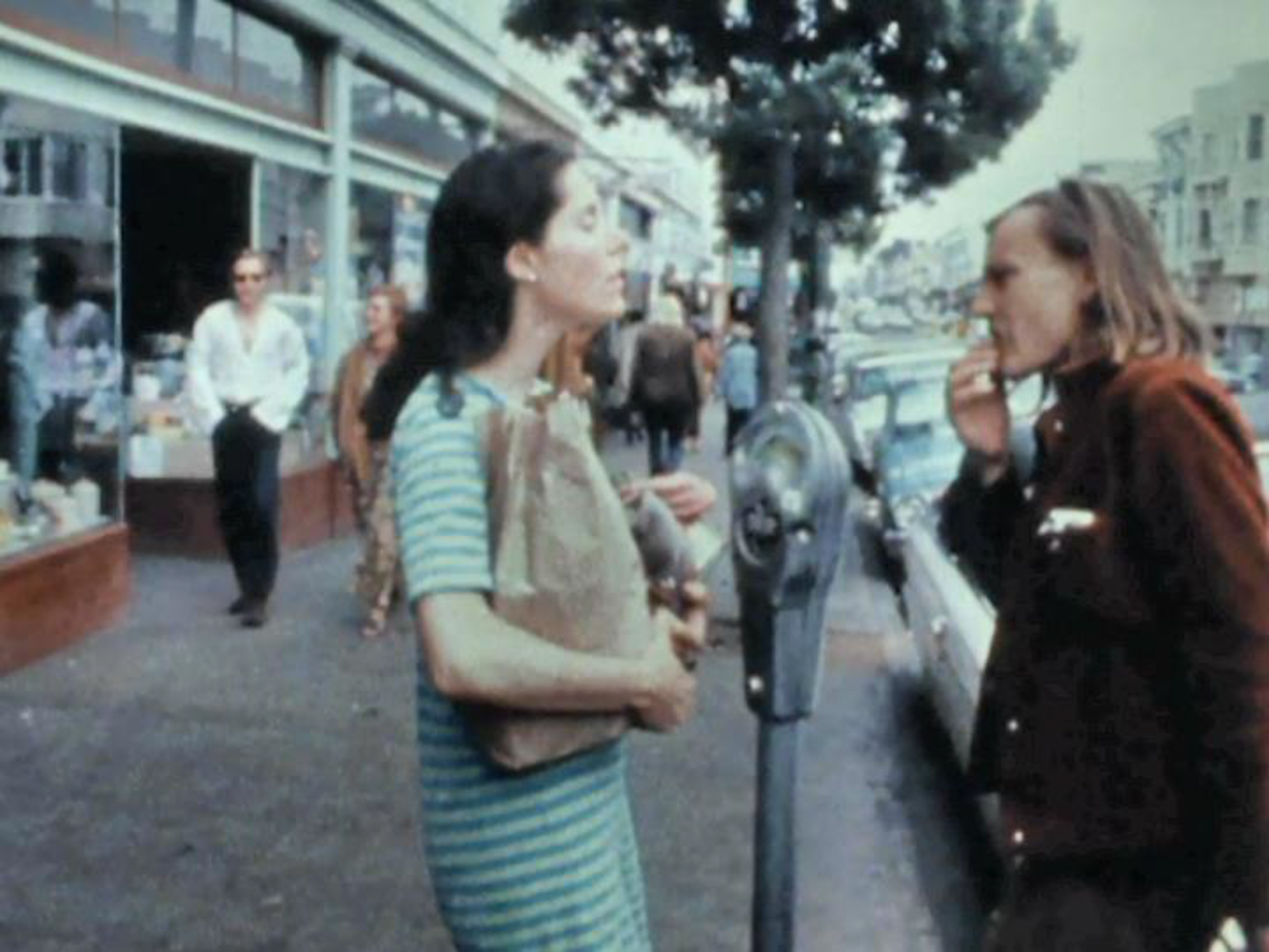
The two Peters—Berg and Coyote—and Emmett, I can’t think of anybody besides those three who was the real core intelligence of the Diggers. A lot of people participated, but they came up with all the ideas. I was there when they created them.
What about Billy Murcott? How did he fit in there?
Billy was Emmett’s best friend in the entire world. He worshipped Billy. They grew up together. Billy was there all the time too. He loved Billy. I don’t think there was anyone in Emmett’s life who meant more to him than Billy. They just were lovely friends.
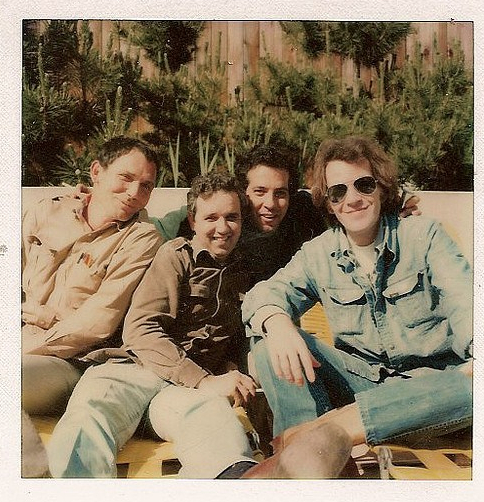
Peter Coyote and Peter Berg… without Emmett, I don’t know if they would have done what they did. I mean, it wouldn’t have diminished them. But I think they would have been more traditional actors, even though they were doing progressive kind of stuff, it would have still remained in that realm, rather than going out into the streets the way it did, with Emmett’s ideas.
Sometimes when I talk about Emmett, people say, Don’t you ever say anything bad about him? Wasn’t there something that happened to you that wasn’t because of him? I just have to say, I don’t think so. While we were together, it wasn’t very long, but it was life-changing. Like for me to be an attorney right now, to stand up in front of people, to defend the rights of all these people who need defending, desperately, I don’t know if I ever would have considered something like that back then, because I was so insecure. And shy.
So you were this 19-year-old young woman from back east who was getting toured around…
“Toured around” is a good way to put it. Being introduced to life in its most pristine element. Because it was all about…Art. Visual art, the art of words, the art of performance, the art of thinking. Everything was put on a higher level. It was so intriguing. I just became fascinated and enamored by these people who could think the way they did, and have such a selfless attitude. That whole concept of autonomy — Emmett’s description of autonomy was standing on a street corner waiting for no one, which is actually a quote from Gregory Corso. Actually it might have been Antonin Artaud. Hearing that was a life-changing statement for me. Everything that they did was life-changing for me. I grew up in Michigan, which is very isolated, it’s surrounded by lakes. No one from the outside world goes to Michigan unless they’re going there to hunt or fish. There’s nice people there, there’s good people there, but of course it’s not cosmopolitan. And so when I met all these young people in San Francisco that were thinking about things that had never occurred to me, and when they would talk about it, everything made sense to me, it was like going to Willy Wonka’s chocolate factory or something: you could end up as a big blueberry or really come out of it in a positive way. That’s how I felt about it.
Also, everybody was really nice. Phyllis [Willner] was my very first girlfriend. I’d never had a girlfriend before. Well I had girlfriends in high school. But I mean a real friend, not just… I don’t know what we were in high school, but it wasn’t friends.
And I loved the poets. And that was one of Emmett’s things, that he loved the poets.
Did you go to poetry readings, or hang out with them in their kitchens, or…?
Both, both. Because one thing we would do at the free stores is have poetry readings. So I’d get to do that. And then, just hanging out with them, in people’s kitchens. Gregory Corso was a person that was easy to be around. He laughed and joked and wrote poetry and had these really wild girlfriends, that were sort of stereotypes of some kind, sort of Italian bombshell types. But I didn’t know him that well, I never hung out with him and his friends other than when I was with Emmett. Or with Lenore [Kandel]. Or with Bill [Fritsch]. Lenore and Bill were living in an apartment in North Beach. In the beginning we used to go over there and visit. They’d all met through Elsa Marley, a painter who was married to Richard Marley, who was a longshoreman. Bill, Lenore’s husband, was also a longshoreman. It was through the Marleys that Peter and Emmett and Peter met Bill and Lenore. And because Lenore was a poet, she knew all those poets, all the old Beat guys.
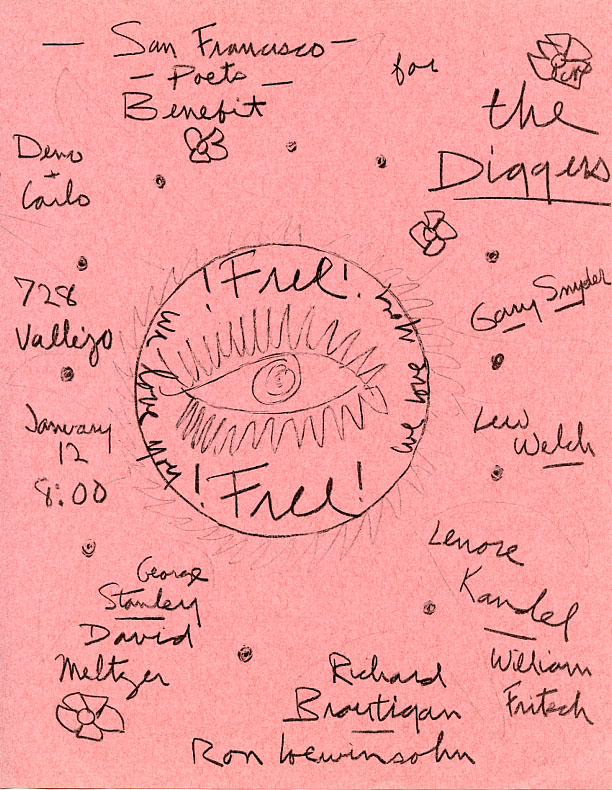
So we spent a lot of time with her and Bill, just being exposed to people who thought in very high-minded ways. Literally. And figuratively.
The free store was a scene.
It was at one of the free stores, I think it was on Sanford Street, that I met Owsley Stanley. It was a cold, windy, stormy night. We were having a poetry reading and showing avant garde-type films. I was sitting by Emmett, and this guy comes up and taps him on the shoulder, very mysteriously, and says ‘Come out with me.’ So Emmett grabbed me too, we went out and there was this big van. We went into the back of it with this guy, and it was lined with all kinds of shoeboxes. The guy opens one up and it is filled to the top with something he called White Lightning, thousands of hits of LSD, little round white pills. I learned then that the man was a chemist named Owsley and that the white lightning was his primo stuff. He gave the shoebox to us, free. So we took that and went back to Emmett’s place, divided it up into little baggies. The next day we gave a full baggie to the street people we knew with instructions that it could not be sold, and that it was to be given away. I heard stories that they would just go down the street see somebody they knew and say, “Hey open your mouth and stick out your tongue.” The city was dosed.
That was the one time I met Owsley. He was real quiet, real dark, an egghead chemist. Oh, the days. I’m glad the statute of limitations has run out!

How important was LSD for yourself, and the others?
I would say very important.
You hadn’t had any in Michigan?
No, are you kidding? I hadn’t had alcohol in Michigan. When I was at Antioch, that’s when I had LSD. And the first time I had marijuana, I was on my very first work-study job away from Antioch. I was in New Hampshire, at the winter school camp I described before. One of the other people who was there from another school that was similar to Antioch, called Beloit, received a little box with marijuana in it. I didn’t even hardly know what marijuana was at that time. Of course I thought, you know, that it was the devil or whatever. But I tried smoking some, while I was knitting a sweater. When I smoked it, I said, I don’t feel anything, what’s the big deal. And then the next morning when I looked at my knitting it was filled with holes and missed stitches. [laughs] But then, all he had was that little bit, so that was the end of it.
The first time I had ever heard about LSD was at Antioch when Timothy Leary and Ralph Metzner came to our campus. They had a slideshow, and they presented it in an auditorium along with a lecture about their experimentations with the drug. The slide show was to give us an idea of the different kinds of visionary changes you might see when you are hallucinating. But at that time I still hadn’t even tried marijuana. My boyfriend at Antioch and his family had spent a year in India, and he had come back with some hashish. So he turned me onto hash. I was with him when I took acid for the first time. We had a lovely day walking around the beautiful Antioch Campus. And then, when it got dark, we went to the movies in town and saw the Beatles’ Help and A Hard Day’s Night. So it was a good trip.
It was just so much a part of everything going on. I never have a bad trip. I thought that it was a very enlightening drug — the things I would think about on LSD changed my life.
Here’s one thing. When I was six years old, on Halloween, my little costume caught on fire. I was burned very severely. I was in the hospital from Halloween til Christmas. Back in those days, the anesthesia they gave you was ether. A terrible drug. Terrible. And they gave me morphine for the severe pain. They didn’t have the other drugs that they have now. So here I am, a six-year-old kid, and I come out of the hospital three months later addicted to morphine, with ether nightmares. I suffered ether nightmares almost all of my life, well into my 30s.
When I became a young adult and I started using drugs… Well, the LSD kind of counteracted the effects of the ether in some ways—instead of having these horrible, horrible frightening things happen, it was more natural and pleasant. I always think that the early experience in my life affected my whole attitude towards drugs and everything. I practice Buddhism now. One of the reasons I practice Buddhism is because it reflects some of the things I learned when I was on LSD. That concept that everything starts with an idea. If you can conceive of it, you can make it happen. That’s a very Buddhist concept, and I use it as my guide during my life. As an added benefit when I started my Buddhist practice I literally faced up to the ether nightmares and chased them away.
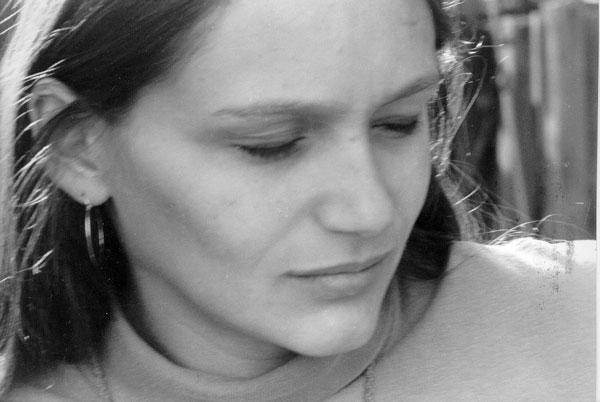
So you never went back to Antioch, you stayed in San Francisco…
I had come out to San Francisco for a three-month or six-month stay, depending on how it went. But I got to where I was like, I’m learning more here than I ever would in a classroom, so why would I want to go back to campus in Ohio when I have this great opportunity.
The Diggers were really active.
I liked the idea that we were providing basic necessities for people: a safe haven to sleep in, clothing at the free store, and free food in the park. Sometimes I think the Diggers invented crash pads. There was the whole issue of the press, Life Magazine and other media sources really pushing the idea that San Francisco was some sort of haven for runaways — “Free Love!,” etc — so hundreds of young kids were coming out, with no directions, thinking ,Oh it’s sunny California and everyone is kind and friendly. But it can be freezing in San Francisco, and there were lots of predators lurking in the shadows.
Now, from the very beginning, many of the merchants on Haight Street were contributing money to the Diggers. The money was used to rent the Free Store, and we also rented apartments, and basically threw away the key. And the word got out on the street, if you need a place to be safe, you can go here. I went to one once with Emmett, but I wouldn’t have wanted to stay there. I thought it was scary. But it was better than being out on the street.
The free food evolved. At one point they stopped saying ‘bring your own bowl,’ because they felt that that in effect made it not free food if you had to bring something in order to get something. So they took that requirement away. And later it went from being just big drums of soup in the park to actually having pickup trucks FILLED with produce, and just going down the street, and calling out, Free produce, free produce. People would come out to the truck and pick out what they wanted and take it home.
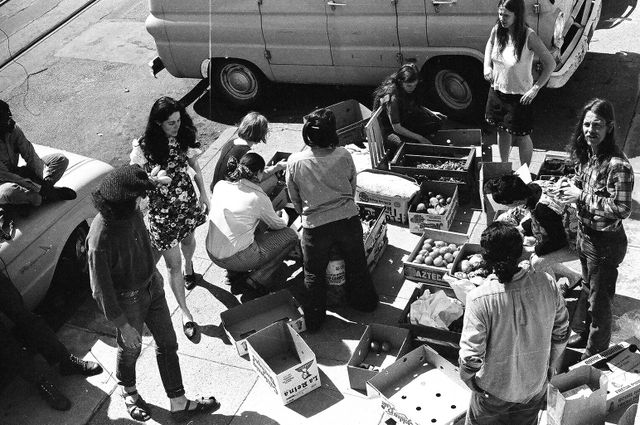
The person who I always think of with that is Vinnie Rinaldi. He came into the scene from Willard Street. Vicki Pollack, Kathy Nolan, Roselee, they all lived at Willard Street. And Vinnie lived there with a pickup truck. So he would drive us, mostly it was the women who went to the farmer’s market to get the free produce. He’d drive us there, we’d fill his truck with all kinds of fruit, vegetables, and even chicken, and then he would drive it very slowly through the area of the Haight-Ashbury. Anybody who wanted to come out and get some free food could come get it. It didn’t have to be Diggers. It wasn’t just hippies.
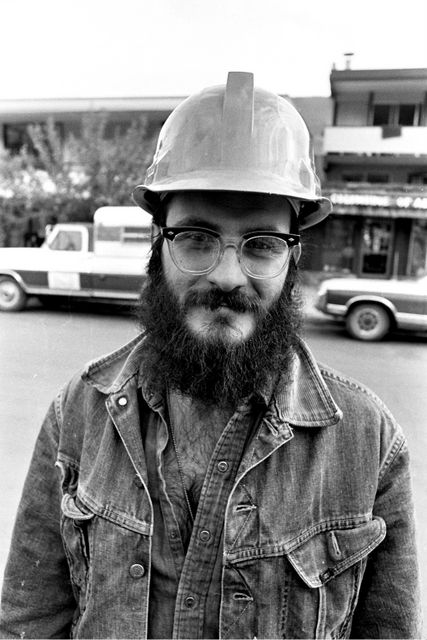
One time when I was working in the Free Store, a bunch of curious little neighborhood kids came in. I told them it was a free store. They went around the store asking, Is this free? What about this? This? This? This? And I answered, Yes, yes, and yes. You can take anything you want. They left with everything they could carry. I was working there a few days later and the same boys came in again, this time with a shopping cart filled with stuff. They told me, Our mothers sent us to bring this to you. I thought, That must have blown their minds. Here they’ve got all this stuff. And their mothers have actually participated. Diggers in training.
There apparently was some relationship between some of the Diggers and the Black Panthers…
I remember that the Diggers wanted to have a good relationship with the Black Panthers, but I don’t think that happened. I think the needs of black people were more dire than what the Diggers had to offer them.
The Diggers published a pamphlet called “Nows Real.” Emmett asked me to do a collage. He said, ‘You have to make a page to represent the Black Panthers,’ which I did. I have a copy of the ordinal pamphlet.
[Points at Diggers sheets] A lot of this stuff is written by Emmett.. He never signed anything. He did all the early writing on his little portable typewriter, in his apartment on Fillmore Street. I look at this stuff, and think, Oh yeah, that’s Emmett’s typewriter. Emmett would do real interesting things like that: move the type around…
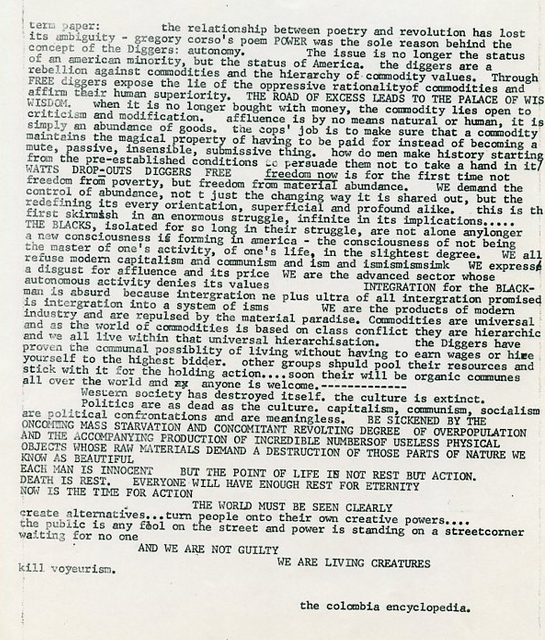
“Today is the first day of the rest of your life.” Can we say definitively that the Diggers coined that phrase?
No, I don’t think so. But I do remember it was from Emmett that I first heard it, and saw it written. It may be that it came out of the Diggers. It may be that Emmett invented it.
The “Natural Suzanne” nickname: what was that about?
That happened when we went to New Mexico and we stayed with this Pueblo Indian and his wife. I picked up on things easily they started calling me Natural Suzanne because I could do anything, whatever. I learned fast so I could repeat whatever I was being taught. That’s how that name came about.
Claude Hayward and Helene were in New Mexico at some point. Do you remember them?
Claude and Helene, I remember them very well. When my babies were about two years old, their father and I split up. He bought me a truck so that I could move away from him and leave Treat Street. My brother Dick Carlton and his wife Pat, along with our good friend Susan Keese drove us to the foothills of the Sangre de Cristo mountains. Helene lived in a seven-room adobe house. It wasn’t like we were super friends or anything, but she welcomed us in and taught me how to garden organically (of course in those days we never heard of organic anything). Claude lived on another side of the mountain but Helene’s children Claine and Haude lived with us in the 7 Room House. That garden was really incredible. She was out there. And from what I hear, she still is.
What about Chester Anderson?
I have a picture of Chester in my mind, but I don’t think I could do a good job of describing him. It would be a very general description. My recollection is all that stuff they had had been stolen. I remember going to their house—they all lived together—and going there for the purpose of getting something or other published. I never hung out with them.
Do you remember anything about the Invisible Circus?
You can’t really forget it. It was a lot of people. They’d opened up the entire church to us. I remember in the planning stage when we went to the Church and met with the second guy in command, not Cecil [Williams], but whoever was his second guy. We were in his office and he showed us his dildo collection. This was this Church guy. He was part of the Church. He had an office, windows, a desk, a door that closed. I don’t know why this happened. He showed us all these dildos. I’d never heard of a dildo, I didn’t even know what it was. So he pulls out, the only one I remember, if you looked at it, it looked like a nun, and if you turned it on the other side, it looked like a penis. [laughs] That was pretty shocking. I was a very naïve person. We went to a free dinner run by the church. After standing in line for our food I remember saying to Emmett, I’ve never seen women that big before. He’s like, Those are men! I said, What? They’ve got high heels on! It was really different. Those people that ran that church definitely were on the edge.
Everybody at the Invisible Circus was kind of insane. People were dressed up in costumes. So many things going on. You know, the Human Be-In, that was pretty much a single stage. The pure Digger stuff was: there is no beginning and no end. You couldn’t pin anything down, say this is where it’s happening, because when you’re saying that, it was happening over there…
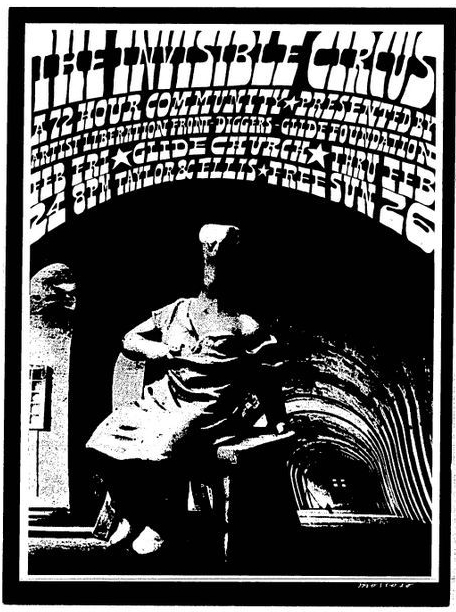
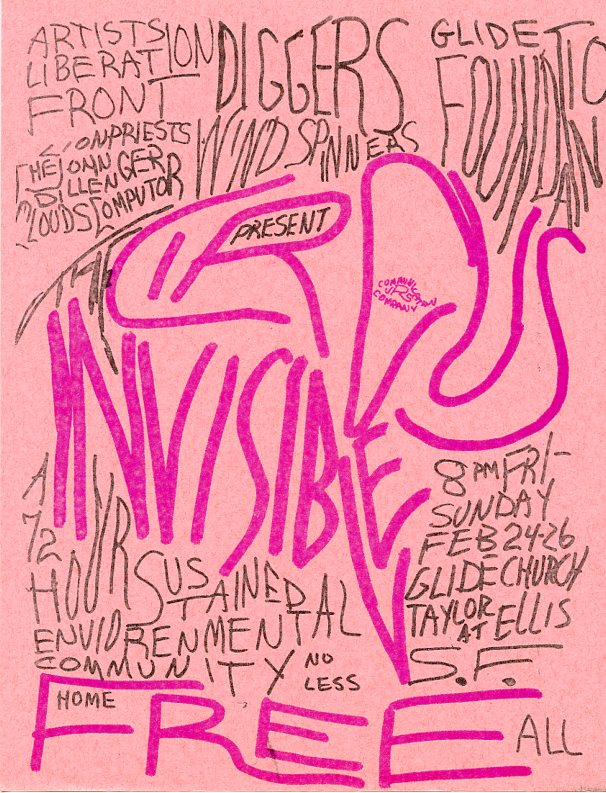
One of the things I remember that I can testify to: They had these totally political type men dressed in suits and ties. They had been invited to participate in a panel on obscenity. While they were talking at a table Peter Berg was running the discussion. Behind them was a book case with open shelving. And during the serious discussion was Kent with his penis wagging. You couldn’t see Kent and the men didn’t have any clue that was happening. That was really disturbing but funny. I saw the whole thing. I can bear witness to it. Emmett filled a room with a whole bunch of plastic. It was maybe waist deep, just piles of shreds of plastic. A precursor to a game for children, for example a pool filled with colored plastic balls. I remember Phyllis dancing on the altar, where the priest usually stands to give a sermon. The Communications Company was set up right there on the scene. Then they had that room where the brides would go to get changed, I think they had that as like a honeymoon suite or something.
I thought the Invisible Circus was pretty chaotic. There were other events that maybe didn’t have that much impact that were more fun. I remember going to San Quentin [State Prison] with the Grateful Dead. They were going to play a free concert, but then the warden wouldn’t let them in, so they set it up on a nearby bluff so that the sound would travel into the prison yard.
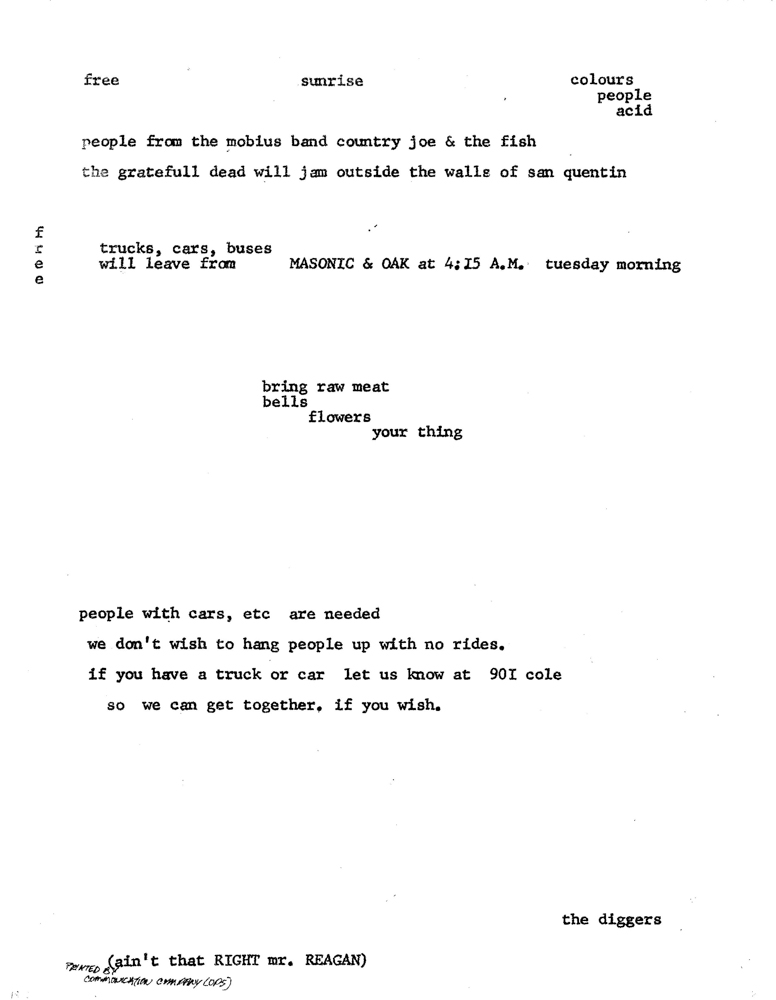
I went to another event with the Diggers and the Cleveland Wrecking Company at the prison for the criminally insane in Atascadero. The warden did let us in for that one. We set up tie-dyed tents, we brought in food, showed the Nowsreal film and danced with the prisoners to the live music.
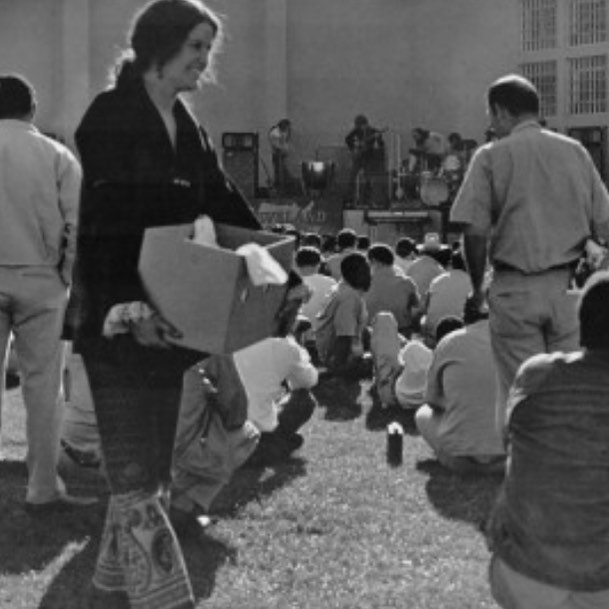
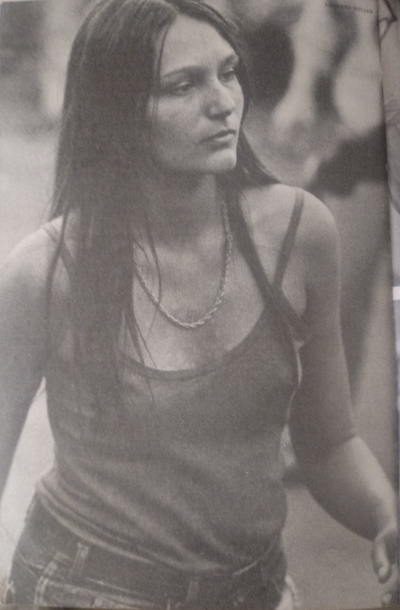
You were at the Alan Burke TV show…
That was so insane. I was supposed to be “Emma Grogan.” See, they wanted Emmett to come on their show. And he said, Okay, if you fly Peter Berg out here. So they flew Peter out. Peter was at the show. But Emmett didn’t want to go, so he talked me into going.
Why didn’t Emmett want to go?
He was very serious about not wanting to be identified as a leader. He was really into anonymity. The only picture that had been published of him at that point was in Ramparts magazine, and it was a little tiny picture, his face was in shadow, and he was wearing a cap and a plaid shirt. So I wore the cap and the plaid shirt. But I didn’t have the skills… I was like, Oh my gosh, what am I doing, how am I supposed to act. Phyllis was there. [Realist editor] Paul Krassner had brought this suitcase filled with melted pies. I gotta admit, I feel bad that I smashed a pie on some poor innocent woman’s face. It was fun when they were dragging me out. I had a guard on each arm, and they were dragging me out of the studio. But I don’t have that good of a memory of it— that one I’ve sort of blanked out. You don’t always want to remember everything.
You went to L.A. with Emmett and Coyote when they were hustling for money…
I went with them but I was never part of the hustling thing. They would go do that on their own. But I did get to spend time in L.A. and hang out with movie stars and producers and all those super fancy people.
Why were these people willing to meet with the Diggers?
I think because it was something revolutionary, and new, and hadn’t happened before, and the people involved with it were all really interesting people.
Diggers weren’t normal activists: they were poets, actors, etc.
Right. That was what it made it so different, because it was street art and street theater.
People were fascinated by you guys.
There was a nun who just loved the Diggers. She would go on the back of Hells Angels motorcycles and take rides. The nun was amazing. She loved us too. Life with the Diggers was really something. God, I was lucky. People who weren’t there, there’s no way to understand it.
Talk about the Hells Angels.
Oh, that was fun. They were always part of the thing. I never knew any of them until I actually lived at a house for a while, the same time Vicki did. Billy and Joanie Batman lived upstairs. It was Pete Knell’s house. He was the San Francisco king of the Hells Angels. To me the San Francisco Hells Angels were kind of like hippie Hells Angels. They weren’t like the Oakland people. I mean, I know, they beat each other up and did all this really mean stuff, but they also had this other side to them. They loved hanging out with us. There was a lot of guys in their 20s and 30s and there were also people in their 40s and older. But it seemed like the San Francisco Hells Angels tended to be pretty young. And we were all sort of wild, you know? They weren’t that much wilder than we were. Well, they were. Much, much wilder.
Were you at Altamont?
No. I know exactly where I was during Altamont. Coyote had a ranch in Olema and I was doing dishes and I had the radio on. That’s where I was when everything blew up.
I don’t really think of Altamont as a “Digger” thing. This is what I remember: The Diggers thought that what the people were doing was dangerous, and that it wasn’t being thought through carefully enough. I remember that at first they were involved in it and then they didn’t want to be involved in it anymore. I do recall very vaguely that it was Emmett, or Peter, or one of them that actually got the Hells Angels to be the bodyguards there, and obviously that was not too good of a plan. It was too big, and too out of control. I wasn’t at Woodstock, but Woodstock was smaller, and had water. And shade. And careful planning.
Did you know Richard Brautigan well?
Brautigan and Emmett were good friends. So, we would go to his house and he would come to our place. One cute thing I remember about Richard. He’d moved into a new apartment, and he had an open house. He had painted goldfish all around the inside the toilet bowl.
Kirby Doyle?
He was very intense and very crazy. Meth, speed — whatever they called it. Speed. He told me once, he said, ‘I have tunnels that have been burned through my brain.’ Now [we know] that literally is true. He knew, even though nobody had shown that yet, he knew that. He was very crazy. Very brilliant but the speed took over his life.
Lew Welch?
I’d met him but I never really knew him. I know he and Lenore were really good friends. Pretty much everybody that I knew was whoever Emmett was friends with. He and Lew Welch weren’t close.
What happened with you and Emmett?
Why did we break up? It was a lot of things. One was he really got involved in heavy drugs. Heroin. He wasn’t him anymore. He’d just be this person who was… the spark of whatever wasn’t there. Sometimes I think, Couldn’t I have been more compassionate? Couldn’t I have been more forgiving? Couldn’t I have been more understanding? But, if I could’ve, I would’ve, and I didn’t, so…
I didn’t have whatever kind of strength it took to stand by him and watch him… It was too much. It was sad. I’m so sorry about what happened to him. He never really wanted to live long. And I’d seen that with people, people who say Oh I don’t want to live past 30—they usually don’t live much past 30. And he was convinced he was going to die early, and sure enough… I think that was just part of who he was. That he saw himself as a bright flash, and then… Well, he spent those later years writing. He was always a writer. That’s what he loved to do, was write. And so that was good, he had a chance to do that.
One fall we went to New York City. Brooklyn was his hometown. To his mother’s dismay I stayed with him there until we actually moved into the city. I met his mother and father and his dear sister, Ellen. His mother prepared a Thanksgiving dinner for his entire family and I was included, so I met all his relatives including his cousin, a Catholic priest. His mom cried the whole time, which made me feel pretty bad, but I could understand her position. When he brought me home he introduced me to his mother as his “Indian Princess.” She wasn’t quite ready for her son hooking up with an Indian, even though it wasn’t really true. She tried very hard to be kind to me, and shared stories about how Emmett always acted the tough guy and got himself into trouble. In one story he ended up in the hospital in pretty bad condition. She said she sat at the foot of his bed, washing his feet, which I assumed was an analogy to Jesus and Mary Magdalene. She was afraid he was going to die.
What did you think of Ringolevio?
I was sad that my grandfather chose to read it—I think it was a contributing factor to his disinheriting me. What’s interesting about Ringolevio is that I am probably the only person who met the real-life person who became the Emmett character in the book. A lot of those stories that Emmett tells were not his story but this other guy’s story. Emmett might have fantasized about murder in the romantic sense of it, but no, I’m sorry, I’m very certain he never did that. Similarly, being a really high class thief of the cat burglar variety. That was his same outrageous friend. Emmett was a good storyteller. He had kissed the blarney stone long before he was even born. And he had such an interesting way of presenting things that… He could tell any story he wanted, and it’s like, maybe it’s true and maybe it’s not, but it’s just for the story and the story is everything.
Heroin is such a deadening drug. Although I tried it, and I’ve got to say, when I used it, I felt comfortable, for the first time ever. And then I thought, why is that? And I think it’s from when I was the six-year-old burn survivor, hooked on morphine. And I went through all those years without it and then when I did take an opiate again, I was in a comfort zone that I hadn’t been in for 20 years, or however long. But what I saw with Emmett? It really ruined his life. And ultimately killed him…
Right now, I work with all kinds of drug addicts and I don’t know anybody who has one crumb of imagination. For five years, I’ve been doing two different drug courts, and it’s a bunch of people who are just, I can’t figure them out. I have one client who’s a really good artist — but he’s the only one. Then, I look back on us: yeah, we were all taking drugs, but we were so creative, we were thinking and acting and doing things. Nowadays the people are just dumb. When they say ‘dope,’ that describes my clients. They’re just idiots. On the other hand, who am I to call them dumb? Many of them are kind and big-hearted people who have no idea how to live a life of freedom. But for a stroke of luck, I could have been lost myself.
I went through this stage, a kind of autism kind of thing, if that’s the right word, I’m not sure. I couldn’t talk. People would talk to me, everything was going on in my brain, but I couldn’t connect between my brain and my mouth to say anything. I was living at Pete Knell’s house at that time. They were very protective of me. Nothing bad ever happened. I remember Peter Berg coming up to me and being like, Well how have you been? And in my brain I was going just like, How have I been? All of this stuff. How am I going to… And then finally he just said, Ah forget you, and walked away. And then my friend Susan Keyes, she also was an artist and a writer and a poet, I remember telling her, I don’t know what to say when people talk to me. She said, Well, just say ‘wow.’ So I learned how to say, ‘wow,’ in a thousand different ways. It was life-saving. I just needed one word to say aloud.
One thing I learned from all that is that I can survive. Another thing I learned is, if there’s something in life that you want, you can make it happen. I decided I wanted to be an attorney. I remember when I decided I wanted to be an attorney. I was living in San Francisco. Bryden Bullington was living with my friend Joan Batman and all of Joanie’s kids after Billy died. They were living in a house on Coso Avenue and I was over visiting. They were telling me about this situation where Bryden had been out on the street selling bunk or something to try to get money for his heroin habit. The police tried to bust him and he ran. They chased him. He ran home and the cops ran in after him. Joanie told me they pushed her against the wall, they picked up her baby and threw him against the wall, they terrified the children and then chased Bryden out the back door. It was so dramatic.
That’s when I decided I wanted to be an attorney. At that point I hadn’t even finished college. But I did I earned my cum laude degree from San Francisco State (with the help of my incredible children) and went on to get my law degree from UC Berkeley despite all odds. I had no one to pay for my education, because I’d burned out my family. But I knew I could do it. You have to focus on it, you have to really want it, and be willing to do whatever you need to get to it, but you can do anything.
Why didn’t the Diggers last?
Why doesn’t a comet stay in the air forever? It was a moment. It was like lighting a match. It was really special. I don’t know.
Was the deluge of kids coming in the summer of ‘67 too much?
That’s what inspired the Diggers. It was after ’67 when it burned out.
You know, it was all street theater. You put on a play, and when it’s on the street, you can’t put on the same play on every night, it’s always got to be a little different.
You’d burn out eventually.
Things changed. The house that I lived in when my kids were born was sort of infamous among us. It was a really fun place to be. It was wonderful. But at some point I left and Vicki was still there, and Vicki would tell me stories of what happened later that were just nightmares. These crazy drug people [moved in], there was no brilliance to them. There was no dream. They were just riding on the tail of it, but not really…revolutionaries. And I think that’s what happened to the Diggers, it just got mundaned out of reality. It couldn’t survive because it no longer had that spark of light to keep it going.
To me, the Diggers were a phenomenon. I don’t know that there’s been anything like them in history — yes, history repeats itself, so there probably was somebody at some time, I’m just not aware of it — a situation where you have a group of people whose goal is to help other people, to bring them not just the basic necessities you need to survive but the things that you need for your imagination, your brain, your growth on other levels. It was like an opium dream or something.
I just think I was so fortunate to be where I was, when I was. Because who knows when something like that will happen again.
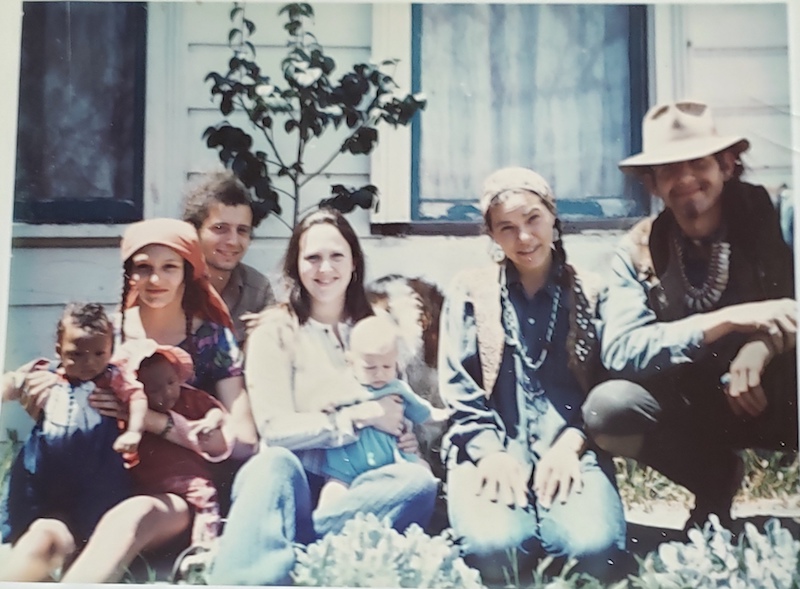
Carl (father of Julie’s baby Justin), Julie Boone, Justin, Phyllis Willner, Peter Coyote. “It was 1970, the year Justin and my twins were born. We’re sitting in front of Sweet Treat Street where the Elite Meet. Title courtesy of Nicole Wills.” Photo probably by Vicki Pollack.
ENDNOTES
1. Siena: After searching for 54 years I finally located my birth father’s children through DNA testing in 2018. He lived to be 93 years old, so I only narrowly missed him. As a side note I think Emmett could have met my father when Emmett had a guest role on a TV show called To Tell the Truth. My father, Leonard Firestone, was the producer of that show.
2. Siena: I have since heard that it was Chester Anderson who wrote the poem so my memory is faulty or the new information is wrong.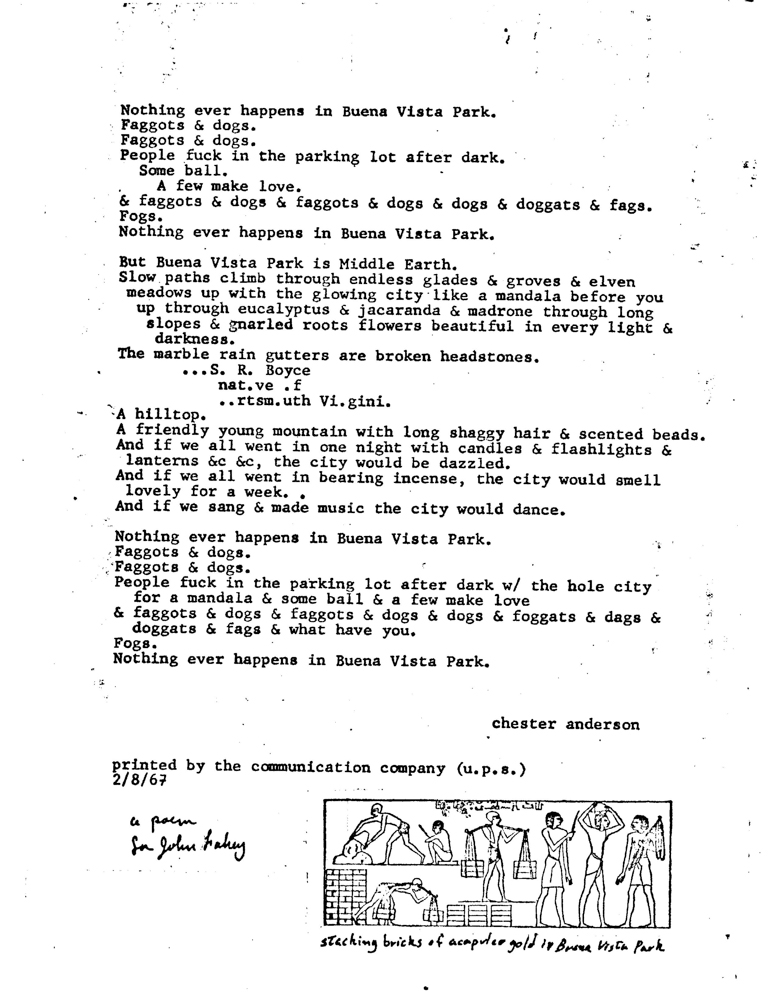
3. Sienna: Joan was with me when my twins were born. My son nearly died due to callousness of the obstetrician and without Joan’s intervention my son would not have survived. I was with her when her son Digger was born. We are still wonderful friends.)
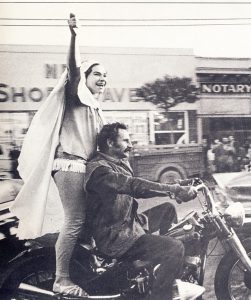
Jay,
How wonderful, as the other Digger interviews were wonderful.I went to Antioch College between 1961-65. A special place and special times. Never met Siena though
And instead of heading west, I went to NYC in ’65 and the New School and the poets. And Paris ’67-68. May ’68 in Paris which was absolutely out of category, up all night for three weeks, changed my head forever
love,
Michael
LikeLike
…thank you for this – I’m from the LA area, and drove my Morris to the Haight in the Summer of ’67, to experience a life-enhancing time – I still quite clearly recall walking thru the streets at night, gazing up at the Victorian houses & hearing Sgt Pepper’s and seeing the colorful sheets on the ceilings. One morning it was still quite early, and I was at the entryway to Golden State Park, and from the very thick fog emerged a vision of a woman & her two white Borzoi dogs. Just two of any number of happy memories – and this is roughly where my life course changed to a more spiritual one – one thing has bothered me so many years later: how could love/gentleness go so out of fashion in the general world? It’s perhaps truest to think that it never really has, it just exists if you can find it, and in fact no matter our impression at the time we were never a majority of the “general world.” Also ZAP… I am grateful for that from this time – the comix as well as the brain zap. Thank again!
LikeLike
…also John Fahey (see the wee scribbled “for John Fahey”) at the end of this piece – 1967 was when I first saw him, at a coffee shop in Montecito…
LikeLike
How beautiful. What a wonderful. I’d longed to read an interview with Natural Suzanne for many years. Thank you, thank you, thank you to both you and her. Her remembrances of Emmett are sweet and poignant. It’s lovely how she still recalls the best in him. FWIW, I live in Yellow Springs, Ohio, where she once lived and, as described above, where she had her first trip.
LikeLike